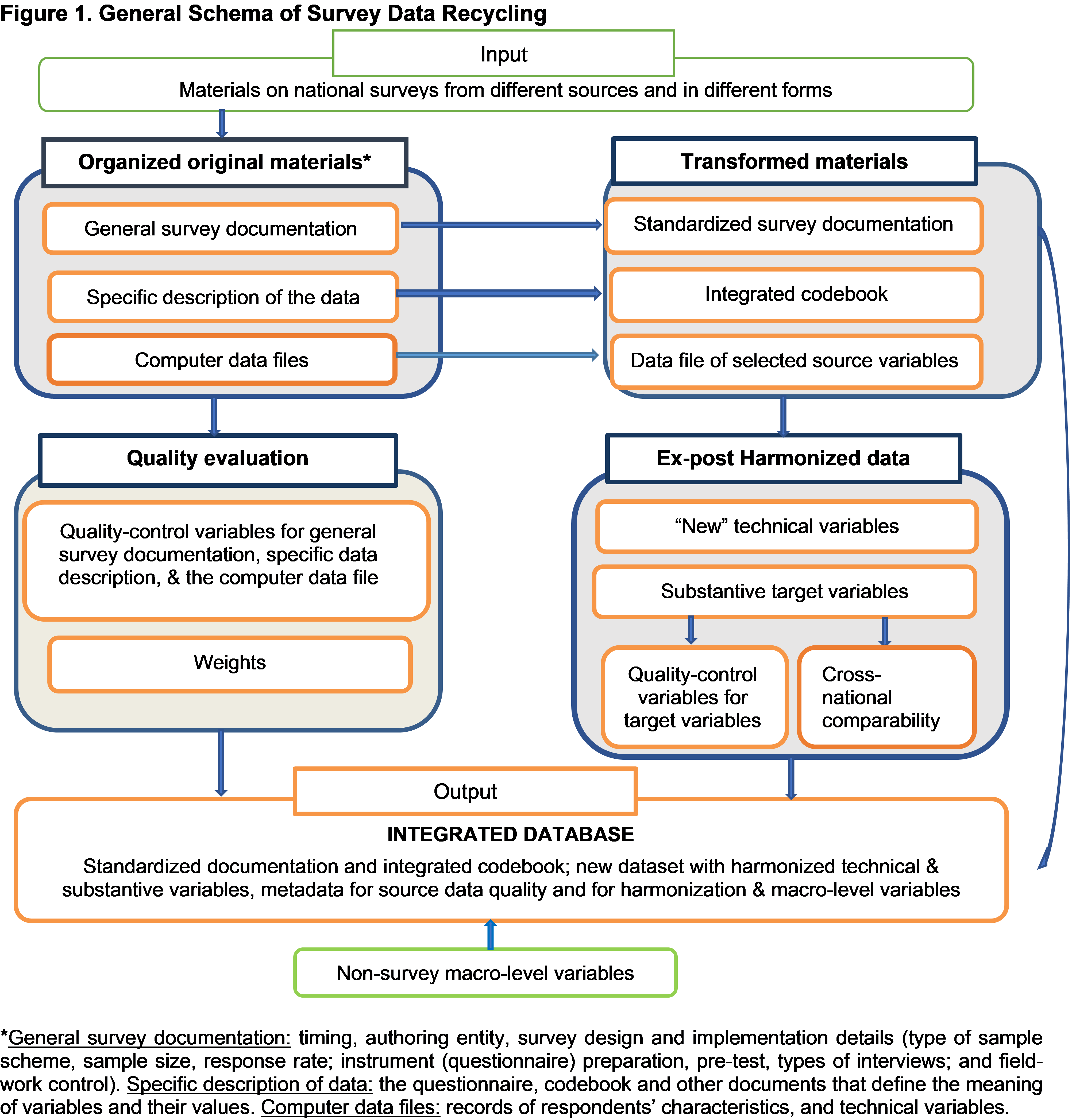About the SDR Project
Survey Data Recycling:
New Analytic Framework, Integrated Database, and
Tools for Cross-national Social, Behavioral and Economic Research
(SDR Project, 2017-2021)
US National Science Foundation (NSF) PTE Federal award 1738502
This project applies the analytic framework of Survey Data Recycling (SDR) that incorporates quality control of the source data into ex-post survey harmonization, to (1) build theory-informed ‘big data’ containing information from extant survey and non-survey sources and newly-constructed metadata, for use in cross-national research; and (2) devise methodological tools for analyzing multi-dimensional data structures stemming from survey harmonization.
Social scientists have free, public access to a wealth of international survey projects, a treasure that the scientific community adds to every year. Yet users of existing surveys encounter difficulties in doing comparative analyses because most of the data are restricted to a particular area of the world and to given time periods; and many are not directly comparable, or even sufficiently documented.
To overcome these difficulties, a growing number of scholars turn to ex-post harmonization of cross-national survey data (Granda, Wolf and Hadorn 2010; Dubrow and Tomescu-Dubrow 2015). In doing so, they face many methodological challenges associated with the lack of standard procedures that would guide the harmonization process and its documentation, and recommend appropriate ways of modeling the resultant harmonized data.
The SDR framework integrates strands of survey methodology that, so far, have been developing in isolation, to propose solutions to some of these problems. The core of this framework are metadata of two types – measures of source data quality, and control indicators for ex-post harmonization – and ways of constructing, testing and using these metadata in substantive analyses. SDR is created with harmonizing international survey projects in mind, but can be applied to other comparative projects. The SDR framework is presented schematically in Figure 1 below.
The SDR project builds on a strong foundation – the study Democratic Values and Protest Behavior: Data Harmonization, Measurement Comparability, and Multi-Level Modeling in Cross-National Perspective financed by the Polish National Centre of Science under an international cooperation grant, and led by Kazimierz M. Slomczynski, Irina Tomescu-Dubrow and J. Craig Jenkins (PIs).
The SDR project enables innovative data-intensive research in key areas of social science interest: (i) Social Capital and Wellbeing; (ii) Social Capital and Political Participation; and (iii) Democracy and Political Participation. Concurrently, it advances the fields of comparative methodology and of survey data harmonization by developing rules for constructing metadata for harmonized datasets, testing the effects of these metadata, and proposing strategies for the statistical use of these metadata.

Source of Graph
Slomczynski, Kazimierz M. and Irina Tomescu-Dubrow. 2018. “Basic Principles of Survey Data Recycling” Ch. 43 in Advances in Comparative Survey Methodology: Multinational, Multiregional and Multicultural Contexts (3MC), T.P. Johnson, B-E Pennell, I. A. L. Stoop, & B. Dorer (eds), Wiley Hoboken, New Jersey.
References
Dubrow, Joshua Kjerulf and Irina Tomescu-Dubrow. 2015. “The Rise of Cross-national Survey Data Harmonization in the Social Sciences: Emergence of an Interdisciplinary Methodological Field.” Quality and Quantity.
Granda, Peter, Christof Wolf, and Reto Hadorn. 2010. Harmonizing Survey Data. In: Janet A. Harkness, M. Braun, B. Edwards, T. Johnson, Lars Lyberg, Peter Ph. Mohler, B.-E., Pennell and Tom W. Smith, eds. Survey Methods in Multinational, Multicultural and Multiregional Contexts. Hoboken, NJ: John Wiley & Sons (pp. 315-332).
0 Comments on “About the SDR Project”